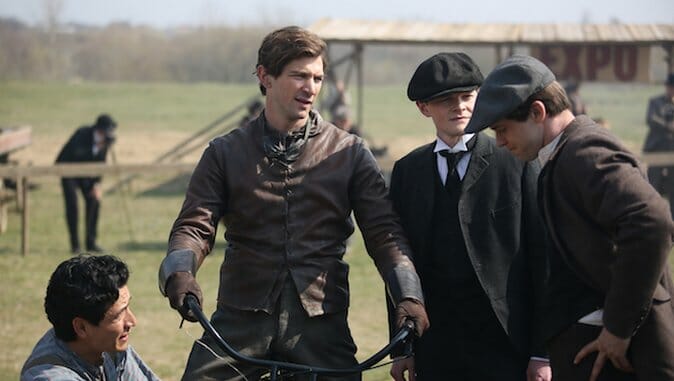The Cast of Harley and the Davidsons Talks Big Thrills in the New Miniseries
Photos courtesy of Discovery
The Discovery Channel has taken two Game of Thrones actors, and one former Little Rascal, to bring us the guys behind the rugged iconic all-American brand—the founders of Harley Davidson. Their new three part miniseries, Harley and the Davidsons is one to watch, not only because actors Michiel Huisman, Bug Hall and Robert Aramayo are engaging performers with significant range, but also because the founders of Harley Davidson are not who most people think they are. And discovering the truth about them makes for a fascinating ride.
The cast members themselves didn’t know much about the men behind the brand before joining the scripted show. “Big bikes and merchandise. Jackets, t-shirts.” That’s what Aramayo, who plays engineer and artist Bill Harley, says he knew about Harley Davidson when he was approached for this role. “All I knew about was the brand, I had no idea the origins of that company and I certainly had no idea that it was the early 1900s. Bill was born in 1880,” the actor who played young Ned Stark tells Paste.
The bike manufacturer was founded in a small shed (for the millennial age, this translates to a parent’s garage) in 1903 by William S. Harley and brothers Arthur and Walter Davidson in Milwaukee, Wisconsin. This series tells the story of its founding and development over 35 years.
Huisman was on the same page as his Game of Thrones co-star, even though he’s a big biker. “I wasn’t familiar with its history really, just the bikes, even though I am a bike rider myself,” he tells us. “I think that most people, even people that love Harley Davidson or have a love for riding motorcycles, don’t really know about the early days of this industry—what it looked like and how all these different brands were sort of pioneering, while at the same time stealing from each other.” Much of this drama is depicted in a series of highly technical and terrifying motordrome (or murderdrome) races.
Needless to say, they’re all experts in the company’s history after playing the founders. However, it’s important to note that Harley and the Davidsons is not a documentary; it’s a drama loosely based on a true story, and one of Discovery’s biggest scripted projects to date (they only just embarked on scripted content in 2013, and previous scripted projects include Klondike).
“This is sort of based on the story; it’s not a documentary, it’s a dramatization,” says Ciaran Donnelly, who directed episodes one and three. “It’s also sort of a love letter to the era, to the time, to the motorcycles and to the three founders of the company. So is it slavishly accurate? No, but neither is any other historical drama.”
Part of this dramatization was based on choice, but it was also due to the fact that only so much is known about each character, and so they had to get creative. “We know certain things about Bill but there’s this hole historically; so going into those holes and creating an emotional arch for this character was exciting to me,” Aramayo says with a smile. “What attracted me to the script initially was the fact that I didn’t expect the man behind all of this to look the way they created him, so it was exciting.” His character, Bill Harley, often wears a newsboy cap and tie. “It’s something that was very striking to me. He’s an artist, a creative. And I found him so interesting in this world.” Bill’s a sensitive guy, as Aramayo puts it, who also dreams of trying to keep up with his aggressive and thrill-seeking friends.
Huisman’s character is, in many ways, the complete opposite, which is also a bit of an exaggeration of fact. Huisman says he used his new job as an excuse to stock up on coffee table books on the history of Harley. “I found a lot of Walter Davidson quotes, stuff that we didn’t use in our show, but was very helpful to me because I was able to take that and combine it in my imagination with what was in the script,” he says, explaining his process. “For example, I found a quote of him describing what it’s like to race the bikes and he says something along the lines of, ‘It’s not so much fear that I feel, it’s more a feeling of dread for the bike possibly breaking down.’ Motorcycle racing was an incredibly dangerous sport; guys were falling off and breaking bones and dying all the time, and the fact that this guy was saying, ‘I’m not afraid, I just hope my bike doesn’t break’…it speaks so much to the character.
“There are a lot of blanks, and we are filling in those blanks by dramatizing our story, and every now and then I fill it in by creating a backstory,” he went on to explain.
-

-

-

-

-

-

-

-

-

-

-

-

-

-

-

-

-

-

-

-

-

-

-

-

-

-

-

-

-

-

-

-

-

-

-

-

-

-

-

-









































